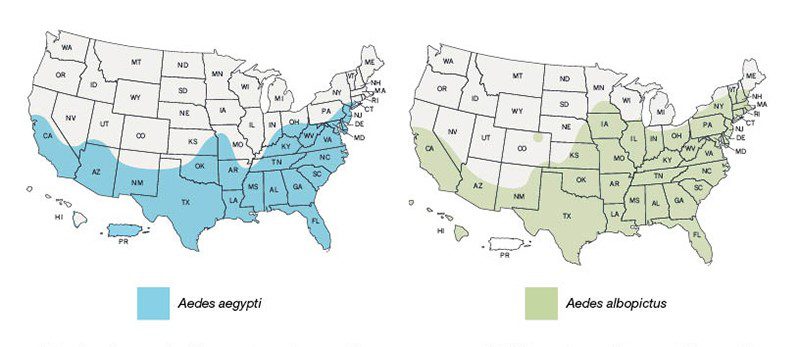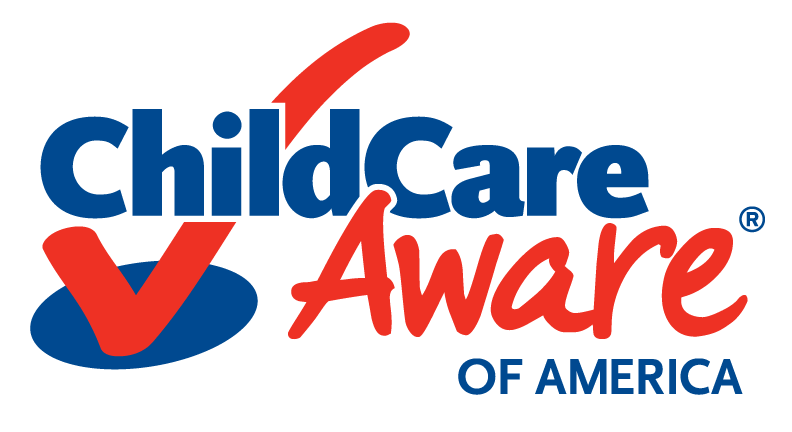

Summer is here, and with it the pesky hassle of mosquitoes. This year, the threat of mosquitoes has been in the spotlight more than usual thanks to the Zika virus. There are many effective ways to avoid mosquitoes and prevent those annoyingly itchy mosquito bites.
Eliminate Places Where Mosquitoes Live and Breed
When we talk about mosquitoes, we are often referring to two main species—Aedes aegypti and Aedes albopictus. These types of mosquitoes live in and around our homes and often bite during daytime hours. These mosquitoes can’t fly very far; if you have mosquitoes near your home, there is likely some standing water close by, which serves as a breeding ground. To combat mosquito breeding areas, remove standing water from bird baths, puddles, gutters, flower pots, trash, tires, and other objects that can hold water.
 Source: Centers for Disease Control and Prevention
Source: Centers for Disease Control and Prevention
Mosquito Repellent
You can further protect yourself and your children by applying mosquito repellent when you are outdoors. There are various types of mosquito repellents available—both in spray-on and lotion varieties. Mosquito repellents, which are technically pesticides, do not kill mosquitoes; instead they make the human body less attractive to mosquitoes, often by masking our smell. The amount of time that a mosquito repellent is effective can vary, and exposure to water or sweat can limit effectiveness.
Mosquitoes and summer sun go hand-in-hand. For that reason, some mosquito repellents contain sunscreen. While it seems like a natural marriage, it is generally recommended that you use sunscreen and mosquito repellant separately. Using a product that contains both a mosquito and sun block can be problematic as sunscreen and mosquito repellant can last for different amounts of time. The preferred method is to apply these separately. For best results, you should apply the sunscreen first, wait 10 – 20 minutes, and then apply the mosquito repellent.
Repellents are Chemicals
Generally repellents are effective; however, we must remember that they contain chemicals and can be harmful to children, especially if exposed to a child’s eyes or mouth. As with any item, it is best to read the label and become familiar with the usage and application instructions. When applying repellent, avoid the child’s hands, eyes, mouth, and any open cuts or rashes. Also, be sure to wash hands thoroughly before eating or drinking. Likewise, when you return inside, you should wash the repellant off the child’s skin. If you have used a spray repellent, consider changing the child’s clothes as well.
Considerations for Spray Repellents
Keep the air inside your home or business healthy. Spraying is a convenient way to apply a variety of products, including mosquito repellent. If you are using a spray repellent, apply it outside and have children hold their breath while you are spraying.
Mosquito repellent should be applied to exposed skin and on top of clothing. You should not spray mosquito repellent under clothing. When applying to the head and face, it is best to spray the repellent into your hands first and then rub on the child’s face. You should never spray repellent directing onto the face of a child. Also, be sure not to spray around food. Following these simple tips will keep chemicals out of your home or office and out of the child’s lungs.
Composition of Repellents
A number of chemicals make up repellents. The Centers for Disease Control and Prevention (CDC) and the Environmental Protection Agency (EPA) recommend using repellents that contain N-Diethyl-meta-toluamide (also known as DEET), picaridin (also known as KBR 3023), oil of lemon eucalyptus (also known as p-Menthane-3,8-diol or PMD), or ethyl butylacetylaminopropionate. You should be able to find these on the label of the repellent.
Restrictions
You can find DEET in a variety of concentrations, from 4 percent up to 100 percent. Generally speaking, the higher the concentration, the longer the protection lasts. In many cases, especially for children, it is better to apply a lower concentration and then reapply versus applying a stronger concentration. The following can be used as a rough estimate: 30 percent DEET will be effective for six hours, 15 percent DEET will be effective for five hours, 10 percent DEET will be effective for three hours, and 5 percent DEET will be effective for two hours.
DEET is not recommended for use on children who are younger than two months old. DEET can be used safely by women who are pregnant or are breastfeeding.
Alberta Health Services recommends that children from six months to two years of age use up to 10 percent concentration, applied once daily; for children from age two to 12, up to 10 percent concentration, applied up to three times daily.
Lemon eucalyptus (also known as p-Menthane-3,8-diol or PMD) is not recommended for use on children who are younger than three years of age.
For children who are too young for mosquito repellant, consider using mosquito nets over baby strollers, carriages, and/or cribs.
When using mosquito repellent for the first time, or using a new brand, make sure the child does not have a reaction once the repellant has been applied. If you suspect the child is having a reaction, call your Poison Control Center at 1-800-222-1222 or seek medical attention.
Steps to a Safe & Fun Summer
Mosquitoes are pesky creatures for sure. The good news is that you can take steps to limit their impact on your summer activities. Eliminating areas where mosquitoes can breed, covering up when going outside, avoiding the dawn and dusk hours, and wearing mosquito repellent are all effective methods. These steps can also aid in efforts to eliminate mosquitoes from your immediate area—consider the average male mosquito only lives 10 days or less, and the average female lives around six to eight weeks. The Aedes aegypti and the Aedes albopictus can’t fly very far, usually only a few hundred feet, so simple steps can keep the area around your home and office mosquito free. We hope you use this knowledge to fight the bite of mosquitoes!
Additional Resources
Below are some additional tools and resources on mosquitos.
Resources for Children
- Centers for Disease Control and Prevention: Zika activity book for children (includes games, pages for coloring, and activities)
- Sesame Street Zika Toolkit (includes videos, activity sheets, and resources)
- The Caribbean Public Health Agency has developed a mobile app game, Zap-a-‘quito, designed to help educate children on the breeding sites of the Aedes aegypti mosquito, which spreads Dengue, Chikungunya and Zika. Available on Android devices here.
- No, No Mosquito: Activity and coloring book developed by Hillsborough County (Florida) Mosquito and Aquatic Weed Control
Resources for Adults
- Food and Drug Administration’s Insect Repellent Use and Safety in Children webpage
- Environmental Protection Agency’s Mosquito Control webpage
{{cta(‘698cb799-7534-4c0b-a2c8-f80962917af3’)}}


